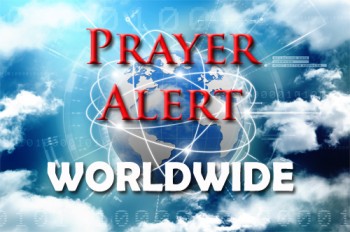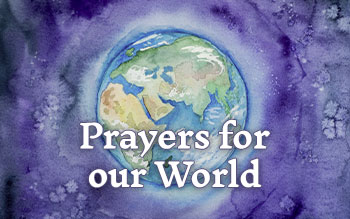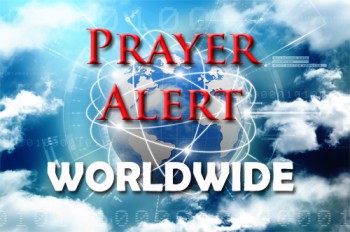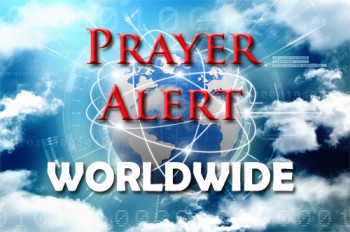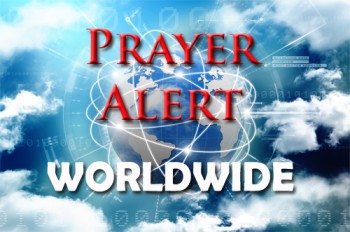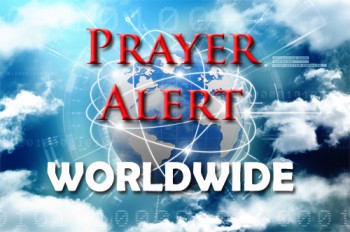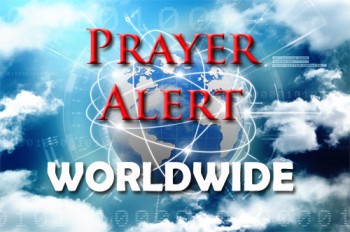Displaying items by tag: Asia
Indonesia: Christian farmers murdered
On 11 May four Christian farmers from the remote village of Kalimago, Poso regency, were murdered by five sword-wielding attackers. The terrorists ambushed a group of farmers who were harvesting their coffee plantation. The victims were aged between 42 and 61. A fellow-farmer saw the suspects carrying firearms and sharp weapons approach the victims before he fled and informed the police, who later said the witness identified one attacker as a fugitive and a member of the IS-linked Eastern Indonesia Mujahideen (MIT) terrorist group. The attack was motivated by robbery and to terrorise local residents. One of the victims was decapitated in this particularly brutal attack. In November, the same Sulawesi-based terrorist group burned down a Salvation Army church and Christian homes, and hacked four Christians to death and beheaded one. The authorities have not been able to capture the fugitives despite months of efforts.
India – Pandemic Crisis
After a year of COVID, it has almost become possible to be desensitised to the human reality behind the appalling statistics – infection rates, death rates, hospitalisations are repeated regularly by governments and news sources, however all these bring with them tales of human pain and anguish. This is none more so than the current situation in India. Even on the surface things look desperate; on 12th May according to official statistics there were over 360,000 new cases and 4120 new deaths. However many fear the reality is far worse than this with Times of India reporting that death figures are likely 3 times higher than those being reported.
 In horrific scenes, at least 90 more bodies of suspected Covid-19 victims have washed up in rivers in India, as the virus continues to spread into poor rural areas. More than 70 corpses were discovered floating in the Ganges River in the Buxar district of the state of Bihar and dozens more bodies were found upstream in the Ghazipur and Ballia districts in the neighbouring state of Uttar Pradesh. See Guardian article.
In horrific scenes, at least 90 more bodies of suspected Covid-19 victims have washed up in rivers in India, as the virus continues to spread into poor rural areas. More than 70 corpses were discovered floating in the Ganges River in the Buxar district of the state of Bihar and dozens more bodies were found upstream in the Ghazipur and Ballia districts in the neighbouring state of Uttar Pradesh. See Guardian article.
Many believe the bodies had been dumped due to the rising cost of cremating bodies, with crematoriums overrun and firewood for pyres now expensive and in short supply.
Images of ambulance drivers throwing bodies over a bridge on the border of Uttar Pradesh and Bihar into the river emerged on social media. The discovery of the suspected coronavirus fatalities was a cause of concern for local villagers who use the river as a source of water for drinking and washing. The Ganges is also the most sacred river to Hindus and is worshipped as the goddess Ganga.
The former chief of the village of Mubarakpur in the district said the dumping of bodies had been happening “for the last week”. Uttar Pradesh and Bihar have blamed each other for the dumping of the corpses. “The bodies have floated into Bihar from Uttar Pradesh,” said the Bihar minister Sanjay Kumar Jha, adding that a net had been placed in the Ganges along the state border to prevent any more bodies floating downstream. Uttar Pradesh authorities have denied all responsibility.
The health system remains overwhelmed. According to the Financial Times, St Stephen’s Hospital in New Delhi was close to breaking point last week as it was inundated by victims of India’s coronavirus crisis. As its beds filled with patients in acute respiratory distress, the hospital’s oxygen supplies ran perilously low. At one point, its giant oxygen tank had just four to six hours of piped oxygen left for 300 seriously ill patients. Calamity was only averted after frantic calls to the hospital’s supplier and desperate public appeals. But days later, the piped oxygen ran out and St Stephen’s had to rely for several hours on oxygen cylinders.
“There’s no oxygen,” said Mathew Varghese, one of the hospital’s senior doctors. “The system is broken down and we’re losing patients. We don’t know what to do. We’re used to saving lives and we’re watching people die.”
The crisis at St Stephen’s reflected how India’s brutal second wave has overwhelmed health infrastructure and pushed the complex medical oxygen supply chain beyond its limits. India is reporting 300,000 infections and almost 3,000 deaths every day. Experts estimate the real figures are probably far higher.
 As patient numbers surged, families across India have engaged in desperate hunts for oxygen cylinders or hospital beds for ailing loved ones. More than 20 patients died last week after oxygen supplies ran out at another New Delhi hospital. Experts said the shortages were largely down to logistical challenges and bureaucratic mismanagement, with supplies in some parts of the country not reaching areas that are more in need.
As patient numbers surged, families across India have engaged in desperate hunts for oxygen cylinders or hospital beds for ailing loved ones. More than 20 patients died last week after oxygen supplies ran out at another New Delhi hospital. Experts said the shortages were largely down to logistical challenges and bureaucratic mismanagement, with supplies in some parts of the country not reaching areas that are more in need.
For a few personal testimonies: of the challenges facing individuals living in India, please see this account by H Kam Suanthang, Elder, EBC Church, New Delhi and a Covid-19 India Prayer Briefing from Rev George Herman here.
Let’s Pray:
At times such as these we remember the words of 1 Corinthians 12: 26-27: If one part suffers, every part suffers with it; if one part is honored, every part rejoices with it. Now you are the body of Christ, and each one of you is a part of it.
We therefore offer our prayers for and stand with our brothers and sisters who are living amidst this uncertainty. We pray for the families of the patients are also going through horrific experiences trying everything to get the medical support for their loved ones where there just isn’t enough infrastructure to handle the scale of the outbreak.
Pray for strength, wisdom and resilience for the medical staff, many of whom are working long hours under great pressure, with insufficient medicine and oxygen.
Pray for more international intervention to provide more of the much-needed equipment and resources.
How to Give:
Many of us are giving already through our already established routes. Here are three options that our readers may wish to consider:
 Chennai, South East India - Onassis Jeevaraj is IPC’s Director for the region and is co-ordinating support for numerous patients and bereaved families in the area. It is relatively small-scale, but Onassis and the team are overwhelmed with the calls for financial assistance both for medical treatment and social need as a result of bereavement. To support this work, please be in touch with Onassis at This email address is being protected from spambots. You need JavaScript enabled to view it. and consider the prayer points he shares with us here.
Chennai, South East India - Onassis Jeevaraj is IPC’s Director for the region and is co-ordinating support for numerous patients and bereaved families in the area. It is relatively small-scale, but Onassis and the team are overwhelmed with the calls for financial assistance both for medical treatment and social need as a result of bereavement. To support this work, please be in touch with Onassis at This email address is being protected from spambots. You need JavaScript enabled to view it. and consider the prayer points he shares with us here.

New Delhi Pop-Up Hospital - The Christian Mount Carmel School in New Delhi has been converted into a 100-bed Covid care centre to help with the crisis. Located in Dwarka Sector 22, it is set to function as a covid care centre with 100 oxygen beds for patients requiring oxygen support. To donate via Delhi House Society, please email them directly for details: This email address is being protected from spambots. You need JavaScript enabled to view it.

GODTV India Appeal - Our friends at GOD TV are co-ordinating a campaign to pray for and raise money to provide practical support for those in India. They highlight that plight of the Indian people - dying alone in their homes, some on the streets, some in their cars. It seems like there’s no dignity for life anymore. People are not valued. One person tweeted ‘death has reached every family now’ in reference to a village in the north of India. Many families have lost more than 1 person and with not enough space to bury the dead, those grieving are not able to say a proper goodbye. You can support their campaign here: https://www.god.tv/
Myanmar – ‘Future lies in darkness’
The situation in Myanmar continues to deteriorate. The devastation is highlighted by Khaing Sandi Win Min, First Secretary at Myanmar's Permanent Mission in Geneva and a member of the Civil disobedience movement opposed to the Military Junta. See here. She writes that since the military coup, Myanmar’s security forces have viciously attacked those protesting peacefully against the military’s seizure of power on February 1. Even away from the streets, the people of Myanmar have been forced to endure brutal human rights violations and crimes against humanity committed by the state’s security forces. Each day and night has become a nightmare for the people. The future of Myanmar lies in darkness.
The systematic and targeted acts of the military and security forces have led to the deaths of more than 750 people, including dozens of children. The junta has also arbitrarily arrested, charged, and sentenced more than 3,400 people. While in custody, many have been subject to various forms of torture, and, in the case of women and girls, sexual harassment and assault. The death toll is increasing daily. The security forces are also targeting the family members as hostages, in order to track down those wanted for participation in anti-coup protests.
Under Myanmar’s junta, fundamental freedoms, including the right to life, freedom of expression, freedom of religion, the right to privacy, and private property rights, have been all but swept away.
All of Myanmar’s people – whether protestors, social influencers, those joining the Civil Disobedience Movement (CDM), or those simply trying to keep their heads down – are living with fear every second, every minute, and every hour. With the economy in a state of collapse, The U.N. World Food Program has estimated that in the coming six months, hunger will hit 3.4 million people in Myanmar, especially in urban areas.
Christians in Myanmar continue to asking fellow believers to join in prayer for their nation following the military takeover in February. It is particularly difficult to live as a Christian in Myanmar at present. Churches have been raided in the wake of the coup, which has been followed by a brutal crackdown on pro-democracy supporters and protesters.
 Many Christians have also lost their livelihoods as well as seeing their Churches raided on a regular basis.
Many Christians have also lost their livelihoods as well as seeing their Churches raided on a regular basis.
Pastors have been doubly hard hit by the pandemic because Covid-19 has prevented Christians from going to church, meaning the pastors are unable to collect the tithes that pay their livelihoods and building rent. Christians in Myanmar have told Open Doors of their fears of night raids on their homes by security forces. Another described "living in fear" on a daily basis.
The cost of food and basic necessities has doubled in the crisis, with many Christian families going without enough food to eat and being unable to go to work for fear of their safety. See here
As we stand with our Brothers and Sisters, we look to these prayer points which have been shared with us:
1. Civil war is breaking out in various places and civilians and ethnic armed groups are fighting back. They are filled with anger from decades of injustice.
Please pray for Godly ways to challenge this military dictatorship.
2. Food prices have gone up 30% and banks are struggling with cash. People have to stand in line half the day just to get access to Limited amounts of cash. The poor and internal refugees are heavily hit.
Please pray for the church to be active in sharing God's goodness and practical blessing.
3. Youth are without a future. Schools and universities have been shut for over a year. Many are distraught. drugs, human trafficking and joblessness are causing a heavy toll on this generation.
Please pray for healthy and inspiring opportunities for the new generation. That they may encounter God's purposes for their lives and a vision in this crisis.
4. The harvest fields are ripe like never before. Many are hungry for Truth, Justice and answers that they are unable to find in Buddhism and Hinduism and Islam.
Please pray for the church to be active, engaged and inspired to be salt and light and transform this nation.
5. We haven't heard from the elected govt for over 100 days.
Please pray that they may encounter God, have a vision of Righteousness for Myanmar and that they may lead with Godly principles of govt.
6. There is fear in the general public. Many are arrested at night and snatched from their homes. The army is using heavy weapons to target civilians. If they lose a battle with ethnic armed groups, they retaliate by shooting at villages from the air. Many are hiding in jungles as a result.
Please pray for protection and failure of weapons and plans that aim to cause havoc amongst the innocent.
India: politics, pandemic, pleading for oxygen
Hospitals rely on daily oxygen deliveries, but they are constantly sending desperate messages for extra supplies. A doctor described the situation: ‘Once you've emptied your main tank, there is nothing to fall back on’. Delhi is running out of cremation space for Covid dead. Pyres burn in families’ gardens. One doctor says hospital patients dying without oxygen prevents him sleeping: ‘I should be concentrating on treating my patients, not running around to get oxygen.’ Many hospitals face the same ordeal. Federal officials reported ‘no shortage of oxygen’, and say the challenge has come from transportation. People are paying a price for political wrangling between the state and federal governments. The price is their life. In November a parliamentary standing committee on health warned of inadequate oxygen supplies and ‘grossly inadequate’ government hospital beds. On 5 May the Supreme Court decided against immediately punishing Indian officials for failing to end an erratic supply. However, significant amounts of oxygen and ventilators are now reaching India from Europe and the USA.
Israel: state inquiry into Meron crush
45 people were crushed to death and over 150 sustained injuries in Israel’s deadliest civilian disaster when a stampede broke out at a densely-attended celebration. Search and rescue authorities struggled to evacuate trapped people after some revellers slipped on steps, causing dozens more to fall over and be crushed. The police commissioner said the handling of the site was deeply flawed. On 3 May the Knesset held a memorial for the 45 victims of the Meron disaster. Benjamin Netanyahu addressed the special session. He was moved by his hospital visit to the injured, saying that Israelis, Jews and Arabs alike, have shown mutual responsibility and a huge heart in their response to the tragedy. ‘The families are not alone, and this is the most important thing.’ He vowed that the government would help them. and the incident would be investigated from every angle.
China: Early Rain Church’s continued persecution
Two and a half years after Chinese authorities arrested Pastor Wang Yi and over a hundred members of Early Rain Church, the congregation is still being harassed for following Christ. Last November elder Yangquan Li was detained for worshiping online from his home; local officials cut off his utilities and internet service. His landlord was also forced to evict him and his family, and they are now closely monitored by police. They are asking Christians to pray for them and for the church. ‘We pray that we depend on God when we lack, because apart from Him we have no good thing’, Yangquan said. ‘We pray God makes us put our trust in Him at this difficult time. We pray the Holy Spirit fills us to respond to our situation with gentleness and respect.’ Despite ongoing persecution, our Christian brothers and sisters in China continue to share the gospel with their neighbours.
India: Covid crisis
Harrowing scenes from India have shocked the world, as it struggles with soaring Covid cases. But the outbreak isn't just India’s crisis - it's a crisis for everyone. ‘Viruses don’t respect borders, nationalities, age, sex or religion; what’s playing out now unfortunately has been played out in other countries’, said the World Health Organisation's chief scientist. We can pray for travel restrictions, multiple tests and quarantine to prevent infections leaking out and for enough vaccines to be available across the nation. Pray for misinformation and mistrust to be replaced by trust and positive take up of Immunisation. Dr Jeff Barrett, director of the Covid-19 Genomics Initiative, said, ‘The higher the number of cases a country has, the more likely new variants will emerge. Every single infection gives the virus a chance to evolve.’ A major concern is that mutations could arise, rendering vaccines ineffective. Pray for God to give medics stamina and hope as they double down on hospital care and vaccination.
Turkey: Armenian genocide
In 1915 two million Armenians lived in Turkey; today there are fewer than 60,000. Successive regimes deny that there was such a thing as an Armenian genocide. Turkey now appears intent on reigniting the hatred by helping Azerbaijan wage war on Armenia in the context of the Nagorno-Karabakh dispute, which erupted into armed conflict in late 2020. Turkish mercenaries and their Azerbaijani partners have ISIS-like behavior. They tortured beyond recognition an intellectually disabled 58-year-old Armenian woman before murdering her. Her family identified her by her clothes. When a random pedestrian was asked, ‘If you could get away with one thing, what would you do?’ She looked at the video camera and smiled saying, ‘What would I do? Behead twenty Armenians.’ 24 April was Armenian Genocide Remembrance Day, marking the start of the period in which Ottoman Turks massacred 1.5 million Armenians during World War I. On 27 April that Turkey said relations with the US had sunk to a new low after Joe Biden formally acknowledged that Armenians suffered genocide 100 years ago.
Japan: Tokyo Olympics and the pandemic
Japan’s government declared a third state of emergency due to rising Covid infections just three months before hosting the 32nd Olympic Games. Documents released on 28 April introduce new Covid restrictions and requirements ahead of the Olympics, with guidelines that limit participants’ movement and require more testing. Takeshi Takazawa of Asian Access said, ‘The government wants to quickly eliminate the rapid increase of new cases with new strands of viruses. We are quite behind with vaccinating the people. We didn’t come up with vaccines of our own, so we depend on US production. Different simulations have been done, and we probably will not be able to finish vaccinating people over 65 before the Olympics are supposed to start.’ One third of Japanese people want to postpone the Olympics for another year; another one third want to cancel it, and the rest want to go ahead after already postponing for a year.
Persistent picketing works
On 16 April Bitter Winter, a magazine on religious liberty and human rights, published the following: ‘His wife’s picket at the Chinese consulate in Almaty got so much attention that the CCP decided to give up, and set her husband free after 17 years of detention. Those who insist that picketing and protesting outside Chinese embassies and consulates is a waste of time were proved wrong in Kazakhstan.’ An amazing Kazakh woman from Xinjiang who had picketed the Chinese consulate in Almaty achieved the return of her husband Rakhizhan Zeinolla. He had been arrested without evidence when he went to Xinjiang from Kazakhstan, and kept in jail for 13 years. Then he was put into a camp, and later was under house arrest.
